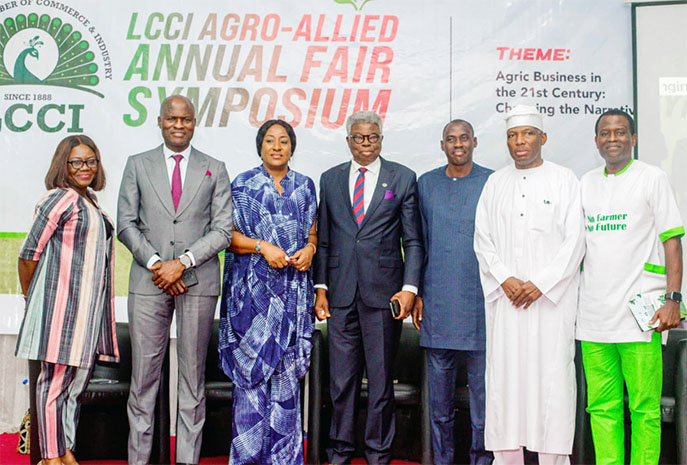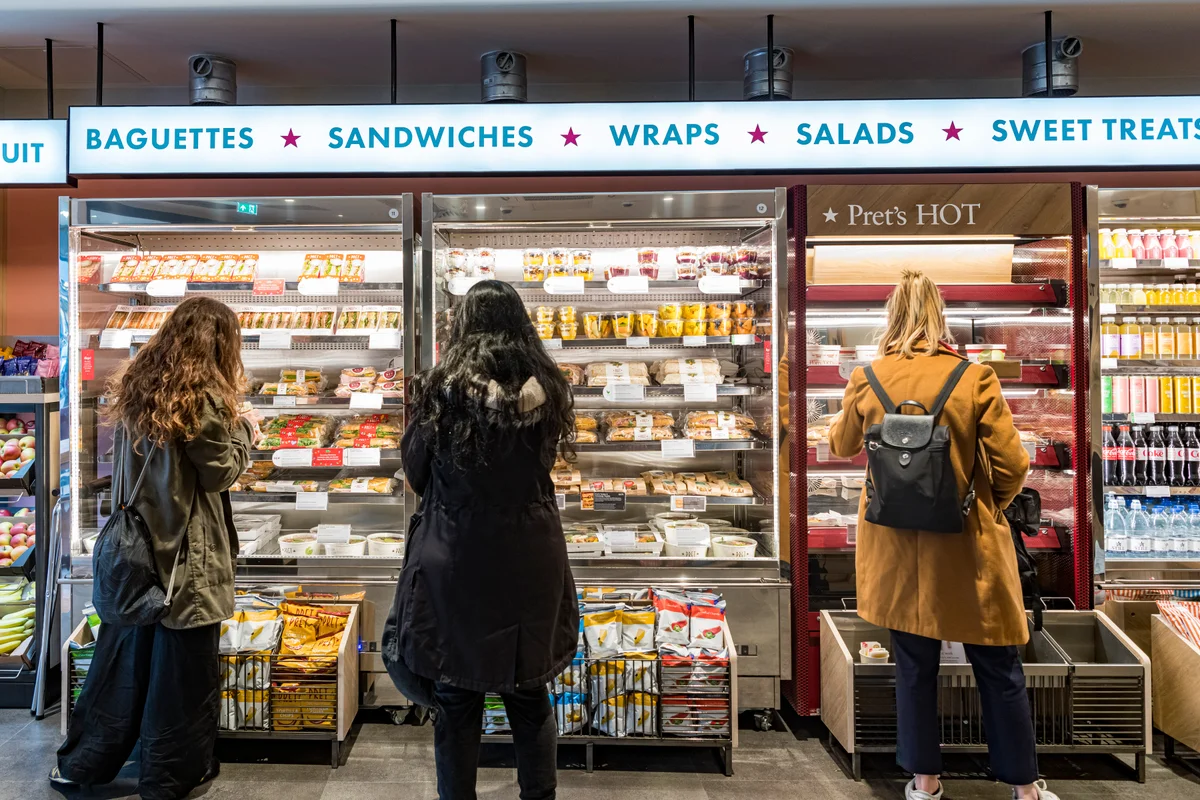By Oluseyi Taiwo-Oguntuase
Copyright independent

Stakeholders in Nigeria’s agriculture and food systems have stressed for the urgent need to reposition farming as a modern, technology-driven, and profitable enterprise capable of creating wealth, reducing poverty, and ensuring food security.
At the Lagos Chambers of Commerce and Industry (LCCI) Agro-Allied Fair symposium with the theme; ‘Agric Business in the 21st century: Changing the Narrative’ held at the LCCI Conference and Exhibition Centre, Alausa, voices from government, industry, and the private sector converged on the same message; which is the old perception of farming as a poor man’s occupation must give way to a new narrative of agribusiness as a competitive, sustainable, and rewarding venture.
Abimbola Olashore, the Vice President of LCCI in an interview emphasised that agriculture must be seen and treated as big business.
He pointed out that in the United States, agriculture is the largest contributor to GDP and the biggest employer of labor, yet in Nigeria it is often associated with poverty and subsistence living.
For him, changing that narrative requires focusing on value addition, best practices, and the introduction of technology to boost productivity.
“In Nigeria, the yield of our agricultural sector is very, very low. How do you increase the yield? By bringing in technology, best practices, and partnering with those that can actually move us forward. We must also look at what other environments like Brazil and India are doing, because they have successfully turned their agriculture into export-driven ventures with value added. For us, it is a matter of learning from them and applying those lessons here,” he said.
Olashore, further stressed that scale is a crucial element that Nigeria’s agriculture currently lacks. Most farms, he noted, are too small to attract investment or to benefit from mechanization, noting that without secure land titles, farmers struggle to access loans, leaving them unable to expand.
“If you don’t have title to your farmland, how do you get a loan? and we all know you need credit in order to expand. We must change the perception of agriculture from something people do when they have nothing else to do, to something that is a serious, bankable business.”
Olashore, argued that the opportunities in agriculture are already evident, with commodities like cocoa and palm oil recording significant price increases globally.
According to him, farmers are quietly becoming billionaires, but because the work is still stigmatised, people fail to recognize the sector’s potential.
He noted that platforms like the symposium are vital because they bring attention to the agribusiness value chain, attract younger people, and show that agriculture is not just about subsistence but about wealth creation and economic power.
Tunde Banjoko, Chairman of the Agro Allied Group placed emphasis on rebranding agriculture to appeal to young people.
He explained that the theme for this year’s symposium was inspired by the need to make agriculture attractive, modern, and respectable. “Like the President said a few weeks ago, agriculture should be sexy. It should be a profession you are proud of. All of us have dreams and aspirations, and you can achieve those dreams while practicing as a farmer,” he said.
Banjoko, noted that one reason agriculture has struggled with poor perception in Nigeria is the image of earlier generations of farmers who often lived in poor conditions.
Many young people, he said, saw their fathers and grandfathers working hard in villages and yet living wretched lives, which discouraged them from entering the sector.
“To correct this, we are focusing on presenting successful farmers who have built sustainable livelihoods. By showcasing their stories and the strategies they used, the symposium aims to prove that farming can indeed be a pathway to success,”
He also acknowledged the structural challenges that continue to hinder progress, including lack of adequate funding, poor access to mechanization, and unfulfilled housing needs for farming communities.
These issues, he said, must be addressed at the national level if agriculture is to reach its full potential, stressing that young people must be inspired with real-life examples of how technology is reshaping farming.
“We want to show them how people are using drones now as farmers, how young ladies are driving tractors on the farm. We want to showcase all this to attract the young ones.”
While industry leaders spoke about perception and innovation, government officials highlighted the structural reforms underway to address inefficiencies in food systems.
Emmanuel Audu, the Permanent Secretary, Lagos state Ministry of Agriculture and Food Systems, explained that the state has embarked on a Food Systems Transformation Agenda designed to reduce post-harvest losses, stabilise food prices, and modernize food distribution.
According to him, Lagos is moving away from traditional food markets to a network of modern food security hubs.
“These facilities will aggregate produce from across the state, grade and package it, and store it in a way that reduces waste and ensures availability throughout the year.”
The goal, he explained, is to reduce post-service costs, which currently account for about 50 percent of losses in agricultural value chains.
“In the first three years, we are looking at, at least 25 percent reduction in post-service costs. This is why food prices are so high, because the bulk of food produced is lost due to inadequate storage and logistics. By addressing this, consumers will have access to food at fairly even prices year-round, whether in season or out of season.”
He noted that the state has also introduced a “Produce for Lagos” program to address one of farmers’ biggest challenges which is access to markets and financing.
According to him, backed by a N500 billion guarantee fund, the program enables farmers to sign production contracts with the state government before planting.
“This means they are assured of a buyer for their produce and immediate payment upon harvest. If a farmer plants 10 tons of tomatoes, the state government is ready to offtake that 10 tons, with that assurance, banks can provide loans confidently because they know repayment is guaranteed. This unlocks financing and ensures farmers are not left searching for buyers after harvest.”
Adding a cultural and historical perspective to the discussions, the Oloni of Eti-Oni, Osun State, HRM Oba Dokun Thompson Gureje IV, delivered a keynote address on the sub-theme Cocoa Farming in the 21st Century.
He emphasised that cocoa must no longer be seen as just a cash crop but as a deliberate and intentional economic activity capable of driving national transformation.
“In short, cocoa farming in the 21st century is not about growing or planting cocoa. It must be an intentional and deliberate economic activity that contributes positively to our GDP, addresses social and ethical issues, offers value that transforms communities, and must be done in a sustainable manner to benefit future generations.”
The monarch traced the history of cocoa in Nigeria to his great-grandfather, who established the first cocoa plantation in Eti-Oni in 1896 after the Kiriji War. While cocoa revenue once built the economy of Western Nigeria, he lamented that the producing communities were left impoverished, similar to Oloibiri where crude oil was first drilled.
He launched the Cocoa Renaissance Initiative to redefine cocoa as a tool for wealth creation and community development, describing it as both an art and a science with immense untapped opportunities.
Oba Thompson pointed out that while West Africa produces 75 percent of the world’s cocoa, the region captures only about $10 billion from a $200 billion global industry.
He warned that unless deliberate steps are taken to add value, build cocoa culture, and embrace technology such as smart agricultural practices, the region risks losing its position to countries like Brazil and Ecuador.
He also drew attention to upcoming compliance challenges, including the European Deforestation Regulation which will restrict market access from 2026.
Beyond production, he stressed that cocoa’s value lies in its multiple uses — from confectionery and pharmaceuticals to cosmetics and fashion — and urged Nigeria to build industries around cocoa by-products.
He further called for regional collaboration through AfCFTA to strengthen trade, ease cross-border movement, and standardize production practices.
Highlighting innovation, he noted research partnerships with Zurich University of Applied Sciences aimed at scientifically classifying Nigeria’s cocoa flavor profiles, as well as new short-gestation seedlings from the Cocoa Research Institute of Nigeria (CRIN).
He also invited participants to the upcoming EKO Chocolate Show 2025 during the Lagos International Trade Fair, describing it as Africa’s first integrated chocolate-culture-commerce platform.
“Cocoa Farming in the 21st Century must be done intentionally with creativity, innovation, and responsibility. It must harvest wealth, prosperity, and development in a way that gives dignity and pride to those involved while ensuring sustainability for future generations.”
The stakeholders thereby emphasized that agriculture must move from subsistence activity to sustainable wealth creation, that by addressing challenges in financing, infrastructure, and value addition, Nigeria can transform its agribusiness sector into a global force.



